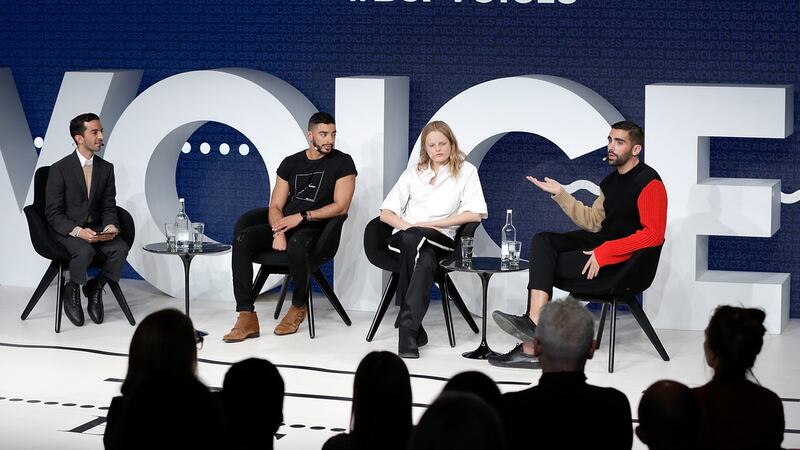
The Business of Fashion
Agenda-setting intelligence, analysis and advice for the global fashion community.

Agenda-setting intelligence, analysis and advice for the global fashion community.

The author has shared a YouTube video.
You will need to accept and consent to the use of cookies and similar technologies by our third-party partners (including: YouTube, Instagram or Twitter), in order to view embedded content in this article and others you may visit in future.
OXFORDSHIRE, United Kingdom — The gender revolution is upon us, and its leaders are urging individuals across cultures and identities to act.
That was the missive put forth today in an electrifying session at VOICES, BoF's gathering for big thinkers. The programme opened with Dr Shazhan Amed, sister of BoF founder and chief executive Imran Amed, who broke down, on a biological level, the complex questions society is grappling with today — What is gender identity? What is gender expression? — weaving in her personal experience as a pediatric endocrinologist at British Columbia Children's Hospital in Vancouver.
“[Gender identity] is not a simple social psychosocial construct of nurture, but rather it’s the complex interplay of environmental, biological, hormonal and even cultural factors,” said Dr Amed, adding that the traditional binaries associated with gender are no longer valid and encouraging attendees to reimagine gender as a continuum.
After Dr Amed's talk, Imran Amed welcomed three influential young leaders to share their personal accounts of non-traditional gender identities. "Every transgender individual does not experience what I experienced," said entertainer and activist Laith Ashley, who transitioned at age 24 after a childhood of feeling uncomfortable playing the role of a girl. He felt "ecstatic" as he documented the way his body changed during hormone replacement therapy. "With every change that happened I felt more whole and complete."
"We all share some universal truths,” he said. “With kindness and openness and the willingness to understand, we can limit suffering in this world.”
Openness was the goal for model Hanne Gaby Odiele when she came out publicly as intersex in January 2017. "Intersex proves that gender as we know it isn't really what it seems," she said. "It needs to be included in these discussions." Odiele has XY chromosomes and was born with internal testes that were removed, unbeknown to her, when she was nine years old. She only discovered the truth about her biology when she was 17. "People are still told that it's only you and no one will understand," she said. "I gained confidence from finding out what was really happening to me. I found a support group and a community."
These experiences are just the kind of stories that Phillip Picardi's new Condé Nast digital publication Them was founded to amplify. As digital editorial director of Teen Vogue, he established it as a resource for today's political and LGBTQ youth. "Teen Vogue really became this symbol of the resistance," he said. But Them is a special dedicated place for modern queer community. "Most queer media services gay men, and we have a trans and non-binary staff who is producing this content, which makes it a radically different approach than a lot of other media organisations."
Picardi called on fashion leaders to make their companies much more inclusive to non-binary gender identities. “It’s on us as cisgender people to help advance the equality of trans people,” he said. “This is a community that is massively disenfranchised and it is on us to not just accept cis passing trans people, but also to help the experience of non-binary people and people who are just beginning their journeys of transitions.
To learn more about VOICES, BoF's annual gathering for big thinkers, in partnership with QIC Global Real Estate, visit our VOICES website and click here to request an invitation to attend.
Related Articles:
[ Condé Nast To Launch New LGBTQ Media BrandOpens in new window ]
[ Will Genderless Fashion Change Retail?Opens in new window ]
From analysis of the global fashion and beauty industries to career and personal advice, BoF’s founder and CEO, Imran Amed, will be answering your questions on Sunday, February 18, 2024 during London Fashion Week.
The State of Fashion 2024 breaks down the 10 themes that will define the industry in the year ahead.
Imran Amed reviews the most important fashion stories of the year and shares his predictions on what this means for the industry in 2024.
After three days of inspiring talks, guests closed out BoF’s gathering for big thinkers with a black tie gala followed by an intimate performance from Rita Ora — guest starring Billy Porter.